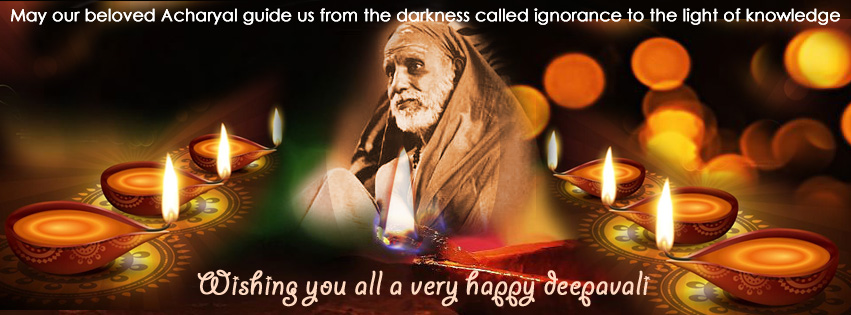Paramacharyal’s Message on Deepavali
Shruti Smriti puranam alayam karunalayam
Namami Bhagavadpadam Shankaram Lokashankaram
There are many festivals in India. Some festivals are celebrated in certain regions, like Holi in Northern India, Onam in Kerala. However, Deepavali is the only festival that is celebrated all over India from Kashmir to Kanyakumari, by everyone without distinction of class and creed. Everyone celebrates with lights, crackers and sweets. Although almanac differs between regions, (suryamanam or chandramanam), Deepavali is celebrated on the same day by all. Why Deepavali is so special?
In ancient Assam, in the city of Prakjothisham, there was a king, Bowman also known as Narakasura. He was powerful and has obtained many boons by his tapas. He was misusing his power and troubling every citizen who feared him and wished his elimination to get peace. Mahavishnu destroyed his prowess and gave peace to everyone. When Narakasura died his mother Boomadevi, who like all mothers should have been grief stricken. However, she was happy because Narakasura had darshan of Mahavishnu and got enlightenment. Narakasura got moksham by darshan of Mahavishnu which many cannot get by doing hard penance for years.
There is Puranam written for every month; like Chaitra mahatmiam, Vaishaka mahatmium. In Tula mahatmium there are 30 chapters that can be read on all 30 days of the Tula month (masam). In this work, in the chapter related to Deepavali it is mentioned “Thaile Lakshmi – Jale Ganga”. It says that on deepavali day, before sun rise, wherever one take oil bath in hot water he gets the same punya as taking bath in Ganga. Every one without exception should take this oil bath, emphasize Tula Puranam.
In ancient Indian system 1 kala is of 6 nazigai and 1 nazigai is 24 minutes. herefore 1 kala is 144 minutes; that is 2h-24 m. Every day time is divided into five periods, namely:
Udaya kala -from suryodaya to 8h-24m; Sangava kala – from 8h-24m to 10h-48m;
Madhyana kala- from 10h-48m to 1h-12m; Aparaana kala – 1h-12m to 3h-36m;
Sandhya kala- 3h-36m to 6h.
Dharma shastras prescribe various karmas and the kala for doing that karma. It is sin to take oil bath before sun rise. However during Deepavali we do; because it is an exception owing to the boon granted to Bhuma Devi who prayed to Mahavishnu that his son Narakasura’s death must be celebrated by taking oil bath in usha kala and they should get punyam for doing this.
His mother prayed “Oh lord! My son is dead but all other people are happy by is death. I am grieved by lose of my beloved son, but Lokashemam is more important than my personal grief. Let this day be celebrated every year with pomp and fair, let every one take oil bath, wear new clothes, eat sweets and be happy, and Mahlakshmi’s grace be showed on them”. It is also believed that Narakasura himself prayed thus before his death. He specifically prayed that those who take oil hot water bath before dawn should get same punyam one gets by bathing in river Ganga, and should have full grace (anugraham) of Mahalakshmi.
The lesson to be learnt is that the Mother set aside her own grief for the sake of welfare of all other species. Both mother and Narakasura wished welfare of the world than their own welfare. If TRUTH is held as the highest goal (Lakshya) and if even that goal is dedicated to Eswara (Eswararpanam) one will get Eswara’s blessings (anughraha) very soon.
We all continuously oscillate between happiness and sorrow. Instead of exaggerating and thinking about our own happy and sad experiences, if our action can bring a little bit of comfort and happiness to some one else we must pray and do that work. This attitude alone is the best. This is the core meaning of festivals like Deepavali. Instead of brooding that “I have problem, I have sorrow” let us pray that entire universe should be happy. Let us pray Sarve jana sukhino bavanthu, Samastha loka sukhino bavanthu.
Paramacharyal emphasized that on Deepavali day everyone should give sweets, new clothes to people in hospitals, anath ashram and needy persons to the extent one can afford.
Total commitment to our action is possible only when the itch of selfish desire is absent and therefore the action is honest.

0 Comments